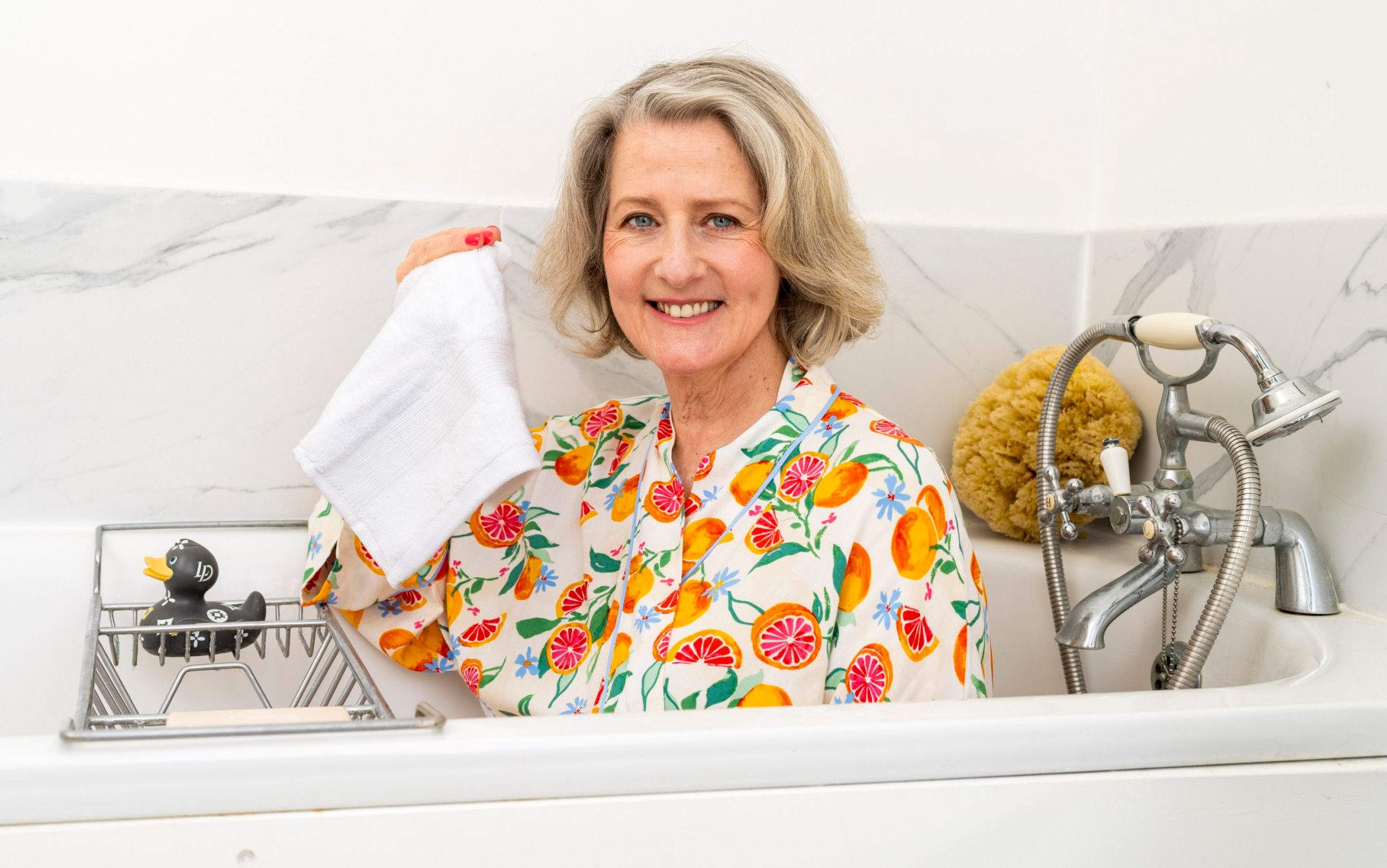The scientific reason why you shouldn’t wash every day

I'm rather low maintenance with personal hygiene and I'm fairly confident that I don't have a strong body odour.
When I say I don't wash, I'm talking about my body, not my clean clothes. I see no reason to strip my body to the same standards as my garments, as the clothes already cover it.
Rarely do I wash my hair, no more than two times a week at most.
On a typical day, I'll swiftly wipe the key areas (underarms and groin area) with soap on the first strike, not requiring it for the second. In summer, when needed, the feet get a quick splash under the shower tap.
About one or two times a week, I'll have a bath – but it's not just for getting "clean" as I'm not a miner, rugby player or an 18th century farmer tending to turnips; it's more a case of indulging in a relaxing soak with Epsom salts, while listening to an audiobook.
I'm rarely dirty, to be honest - my skin never seems to carry any dirt or stains, apart from after gardening, where my hands get all mucky. So, I don't see why I should use a body wash, which is just another name for that lovely-smelling washing-up liquid, that is.
We've all become accustomed to having invigorating hot showers each day, but it's a relatively recent development in terms of cultural habits here.
– with the daily flannelette wash keeping everything spotlessly fresh in between.
Let's revisit the flannel concept for several reasons.
And much like this finely balanced system, the skin microbiome doesn't thrive when repeatedly stripped by detergents based on petrochemicals, any more than the gut microbiome fares well under a barrage of antibiotics.
Our two microcosms share some similarities. Both consist of a blend of microscopic life forms – bacteria, viruses, and fungi – some of which are advantageous while others are not – and each person has a distinct combination.
The skin microbiome is also an integral part of our immune system, much like the one found in the gut – and these two systems work together, communicating through the body's intricate network of cells and signal molecules.
We coexist in a harmonious relationship with the multitude of viruses and bacteria that inhabit our skin's surface, working alongside them in a delicate ecosystem.
do.
As Dr Robert H. Shmerling, a senior faculty editor at Harvard Health Publishing, notes: "It's essential for our immune systems to be triggered by harmless microorganisms, dust, and other substances in our environment, allowing them to develop protective antibodies and a lasting defence mechanism."
.”
Using too many strong detergents and factory-made soaps can strip the skin of its natural oils, although those made from natural ingredients don't have quite the same effect.
So, we rinse off these valuable moisturising oils with shower gels and body washes, which typically come in single-use plastic bottles, and then use body lotions, which often also come in single-use plastic bottles.
It's environmentally unacceptable, but, like many problems that are bad for the environment and public health, there is a massive industry that focuses on making us believe that this plastic-packed double threat is a necessary part of our daily routines and supermarket trips.
It isn’t.
It's worth noting that not washing our skin at all can be problematic, but excessive scrubbing isn't necessary to keep it clean. Our skin plays a vital role in detoxification, so, if you still see dirt on your skin, a gentle wash with warm water should suffice.
Dr Teri Greiling explains, "Water is perfect for removing sweat and dust and everyday lint from our skin, while soap is particularly effective at stripping oils from skin."
Even if you tend to be someone who sweats a lot, such as after a workout and smell, like my husband, you'll find that warm water is sufficient. You should bear in mind that the warmth of the water doesn't have to be scalding.
There's another good reason to scale back on your daily steaming and foaming routine: it's expensive.
According to reports available online, on average, since water charges differ across the country, a typical 10-minute power shower - which is standard for many people in the UK - would cost about £1.40 per session. This adds up to around £500 per annum.
Even when allowing for the occasional bath that I never overfills, which costs approximately 85 pence per time, I'm saving £300 annually by taking a more moderate approach to bathing. Since my husband follows the same routine as me, we're saving £600 in total.
That's a mini-break. Including a pleasant evening meal.

Another great advantage of this showering regime is the significant amount of time it saves for you.
I can get myself ready to go out in the morning, from waking to leaving the house with full makeup and my outfit in just half an hour, having a quick tidy, rather than having to do a full get-ready routine. It's really transformed my mornings.
And you'll have bath towels that don't stay damp for ever.
There's one aspect that's still holding many people back from giving up on their daily shower routine – or perhaps they just don't feel comfortable admitting to it. A certain stigma surrounds not following the conventional standards of body bathing.
When I got in touch with the two mates, a couple, who'd initially prompted me to rethink my daily shower routine.
A partner in the research discovered the concept of the skin microbiome during his university studies of biological science in the 1960s. He hasn’t used soap on any area of his body since then, simply relying on water for cleansing. His wife adopted the same habit after meeting him, 20 years later.
They're both staunch soap-phobes, yet feared letting the cat out of the bag, in case they'd be judged or thought a bit odd for it. To be frank, I had second thoughts about penning this piece, for fear of a similar backlash.
To be honest, I can assure you that neither of my friends has a strong body odour or appears unclean.
I visit the hairdresser approximately once or twice a week. For the essentials, we have a bidet and we simply use warm water.
I do wash my hands with soap, that's actually the one area where I'm meticulous. Having completed health and safety training as a café owner, I'm well aware of what can compromise hygiene, so I always make sure to wash my hands before handling food.
We rarely discuss it, because most individuals aren't aware of the issue. All of us have been conditioned by the widespread promotion of daily cleanliness and grooming from various large industries. While it's true that there were sound reasons to enhance personal hygiene in the past, we've clearly overdone it.
Perhaps there are those who quietly don their 1950s-style dressing gowns each morning, but cautious of broadcasting it. I have taken the step: I don't shower every day – and I'm willing to share, perhaps encouraging others to reconsider their own routines.
As Dr Shmerling so astutely points out, "Habituating to excessive cleaning of the body is unlikely to be a significant health concern, on the other hand, taking showers every day does nothing to improve your health and wastes a considerable amount of water."
Adopting a change in your washing routine, similar to that of the majority of the British public until the mid-1970s, will help to reduce the use of single-use plastics, boost your immune system, and save you time, water, and money.
Daily showers are unnecessary and can be beneficial to ditch.
Maintaining cleanliness and caring for your skin's microbial ecosystem, as well as the environment and your finances:
Improve your mind and lift your spirits with The Telegraph's excellent collection of Puzzles - leaving you feeling more radiant every day. Challenge yourself with PlusWord, the Mini Crossword, the challenging Killer Sudoku, and classic Cryptic Crossword, all designed to sharpen your brain and elevate your mood.
Post a Comment for "The scientific reason why you shouldn’t wash every day"